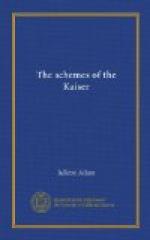From each department of the public service William lifts an important part of its business. From the Department of Education he takes the direction of public worship, which, in his capacity as summus episcopus, he proposes to control in person. From the War Department he takes the section having control of maps and fortresses, which, he proposes to place under the general staff and his own direction. He is planning to make a province of Berlin, so that he himself may govern it in military fashion, etc., etc. Is it possible that the mind of such a man, thus inflated with pride, should not succumb to every temptation of ambition? Is there any one of those about him, or amongst his subjects, who can say where these ambitions will end? When one thinks of the mass of ambitions and emotions that William II has exhausted since he came to the throne, when one thinks of the difficult questions he has raised, the obstacles he has created and the enterprises he has undertaken, how is it possible not to fear the future?
Germany is beginning to be oppressed by a feeling of uneasiness. She is beginning to realise that her Emperor, by designing the orbit of his activity on too large a scale, is producing the contrary effect, with the result that sooner or later, the narrowing circumference of that orbit will close in upon him, and he will only be able to break its barriers by violent repression from within and by a sudden outbreak of war without. Militarism and militarism only, the passion for which is ever recurrent with William II, can satisfy his morbid craving for movement and action. Thus we see him celebrating the Anniversary of William I by a review of his troops and by a speech, so seriously threatening a breach of the peace, that even the newspapers of the opposition hesitate to reproduce it. All France should realise that the German Emperor will make war upon her without warning and without formal declaration, just as he surprises his own garrisons. By his orders, the statement is made on all sides that the rifle of the German army is villainously bad. Let us not believe a word of it. On the contrary, we should know that the greater part of the Prussian artillery is superior to ours; let us be on our guard against every surprise and ready.
April 28, 1891. [7]
On the occasion of the presentation of new standards to his troops, the Emperor observed that the number 18 is one of deep significance for his race, that it corresponds with six important dates in the history of Prussia. “For this reason,” he added, “I have chosen the 18th of April as the day on which to present the new standards.” As William II himself puts it, this day, like all the “eighteenths” that went before it, has its special significance.
The strange words uttered by the monarch on this occasion—always intoxicated with the sense of his power, and sometimes by Kaiserbier—are denied to-day, or perhaps it would be more correct to say that the Monitor of the Empire has not published them. “Let our soldiers come to me,” he proclaimed in the White Hall, to “overcome the resistance of the enemies of the Fatherland, abroad as well as at home.”




